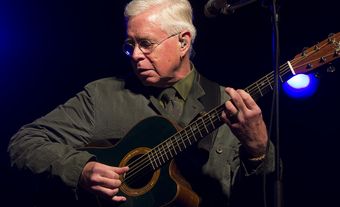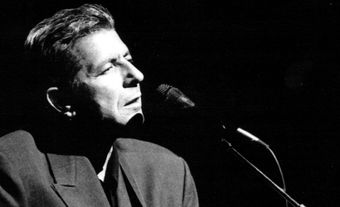Arthur Reginald Scammell, CM, teacher, songwriter, singer, poet, writer (born 12 February 1913 in Change Islands, NL; died 28 August 1995 in St. John’s, NL). At age 15, Scammell wrote what was to be his most famous song, “Squid-Jiggin' Ground,” featuring a wonderful collection of characters participating in a traditional Newfoundland outport activity. He taught school in Newfoundland and Montréal, and eventually at Memorial University in St. John’s. A collection of his prose and verse, My Newfoundland, appeared in print in 1966 and on record in 1974. He was made a Member of the Order of Canada in 1987 for “keeping Newfoundland history alive in song, verse and story.” “Squid Jiggin' Ground” was inducted into the Canadian Songwriters Hall of Fame in 2011.
Career Highlights
Scammell’s mother was a church organist in the town of Change Islands in Notre Dame Bay. In 1928, at age 15, he wrote the song “Squid Jiggin' Ground” as a high school project, adapting his own lyrics to the Irish fiddle tune “Larry O'Gaff.” Scammell taught school in various Newfoundland outports (1932–39) and in the Montréal suburb of Mount Royal (1942–70). He earned an honours BA in English at McGill University in 1942.
“Squid Jiggin' Ground” was first published by Gerald S. Doyle in his anthology Old-Time Songs and Poetry of Newfoundland (2nd ed., 1940). Scammell’s widely successful 1943 recording is regarded as the first commercial recording of a Newfoundland folk song. Scammell made five 78s (nine songs, including “Squid Jiggin' Ground”) in 1943 and distributed them privately. He also wrote articles on local folksong for the Atlantic Guardian magazine, which he co-founded in 1945, and was published extensively in the Newfoundland Quarterly.
Scammell continued to write songs about traditional Newfoundland outport life, and gave private and school concerts in Newfoundland. His “The Newfoundland Come Home Song” was the official theme song of the province’s Come Home Year in 1966, and “Six Horsepower Coaker” was also popular. His songs, verses and sketches of outport life were published in his book, My Newfoundland: Stories, Poems, Songs, in 1966. That year, he also obtained his master’s degree in Teaching from the University of Vermont.
After his retirement to St. John’s in 1970, Scammell taught English at Memorial University and released the LP My Newfoundland (1974, Audat 477-9043), which featured Scammell reciting and singing his own works. He continued to write songs (e.g., "A Sealer's Song," 1977), and publish poems and stories about life in Newfoundland outports.
Honours and Legacy
Scammell was described by the discographer Michael Taft as the first person to record specifically for the Newfoundland market. “Squid Jiggin' Ground” was played on the Peace Tower carillon on Parliament Hill in Ottawa to mark the entry of Newfoundland into confederation in 1949. It was inducted into the Canadian Songwriters Hall of Fame in 2011. The Newfoundland and Labrador Arts Council established a writing award in Scammell’s honour in 1985, and the school in his hometown was renamed the A.R. Scammell Academy in 1990.
A version of this entry originally appeared in the Encyclopedia of Music in Canada.
Awards
Honorary Doctor of Laws, Memorial University (1977)
Member, Order of Canada (1987)
Inductee (“Squid-Jiggin' Ground”), Canadian Songwriters Hall of Fame (2011)
Writings
Songs of a Newfoundlander (J.H.A. Labelle, 1940).
Mirrored Moments (Montréal, 1945).
My Newfoundland: Stories, Poems, Songs (Montréal: Harvest House, 1966).
From Boat to Blackboard (St. John’s: Harry Cuff Publications, 1987).
Newfoundland Echoes (St. John’s: Harry Cuff Publications, 1988).
Collected Works of A.R. Scammell (St. John’s: Harry Cuff Publications, 1990).
We Go A-Fishing (St. John's: Jesperson, 1994).

 Share on Facebook
Share on Facebook Share on X
Share on X Share by Email
Share by Email Share on Google Classroom
Share on Google Classroom


